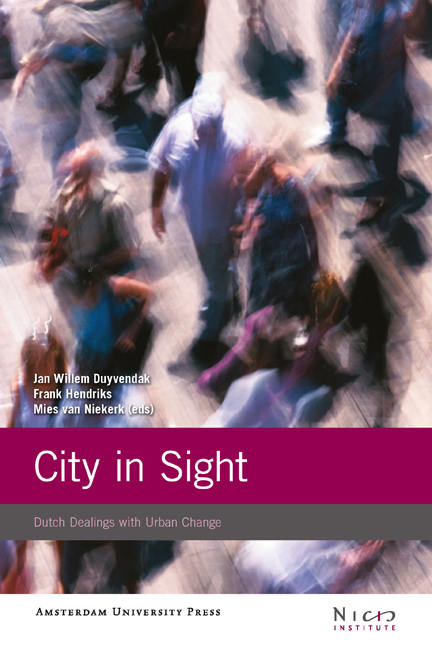Book contents
- Frontmatter
- Contents
- Acknowledgements
- Cities in Sight, Inside Cities: An Introduction 9
- Part I Urban Transformations and Local Settings
- Part II Urban Citizenship and Civic Life
- Part III Urban Governance and Professional Politics
- The Dutch Orange and the Big Apple: A Comparative Commentary
- References
- Notes on Contributors
- Index
6 - A Little Less Conversation, a Little More Action: Real-life Expressions of Vital Citizenship in City Neighborhoods
Published online by Cambridge University Press: 19 January 2021
- Frontmatter
- Contents
- Acknowledgements
- Cities in Sight, Inside Cities: An Introduction 9
- Part I Urban Transformations and Local Settings
- Part II Urban Citizenship and Civic Life
- Part III Urban Governance and Professional Politics
- The Dutch Orange and the Big Apple: A Comparative Commentary
- References
- Notes on Contributors
- Index
Summary
“A little less conversation, a little more action…”
(Elvis Presley, 1968; Junkie XL, 2002)Introduction
In recent years, ‘citizenship’ has become a much-discussed topic in Dutch politics and media (Hurenkamp & Tonkens 2008, pp. 15-16). In public debate – in the Netherlands as well as in other Western countries – discussions often focus on the supposed lack of citizenship (Van den Brink et al. 2004; Van der Lans 2005, Van den Brink & Petter 2005; Hurenkamp & Tonkens 2008). In this chapter, however, we will home in on expressions of what we call ‘vital citizenship ‘ in the context of Dutch city neighborhoods. We will look at present-day expressions of viable and productive citizenship: initiatives of citizens (inter-) actively and (co-)productively trying to make their neighborhood a better place to live.
The central question we will answer in this chapter is ‘How can present- day vital citizenship in city neighborhoods be understood?’ On the basis of research we conducted over the past three years, we will present a typology of vital citizenship in city neighborhoods that offers a framework for identifying and interpreting the diverse and in practice often entangled expressions and practices of citizenship in Dutch neighborhoods. We go into the empirically dominant expressions of vital citizenship in the neighborhood, and the characteristics, drivers and implications of these various forms of present-day citizenship.
We mirror the Danish ‘everyday maker’ as typified by Bang and Sørensen (2001) to observations of vital citizenship in a Dutch context. Bang and Sørensen's everyday makers are active on a local (neighborhood) level, they are able to self-organize and seem to ‘get things done’ in the neighborhood. They do it themselves, they do it locally, concretely, and they only cooperate with the system if need be (Bang and Sørensen, 2001). In the Dutch context, however, two specific variants on the everyday maker appear to come to the fore in a particular way: the ‘everyday fixer’ (Hendriks & Tops 2002; 2005) and the ‘project conductor’. In this chapter, we will look at both. In addition to these two types, two other types of vital citizenship appear to manifest themselves. At a further remove from Bang and Sørensen's ideal type of the self-organizing, non-conventional everyday maker, we distinguish the ‘neighborhood expert’ and the ‘case expert’.
- Type
- Chapter
- Information
- City in SightDutch Dealings with Urban Change, pp. 121 - 140Publisher: Amsterdam University PressPrint publication year: 2009
- 2
- Cited by



